
Body Powder: Baby Me! Unscented Baby Powder
- Out Of Stock

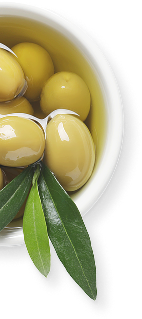
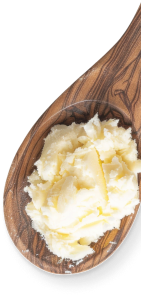
An organic deodorant with no added scent that readily absorbs into the skin. Shea butter, jojoba oil and coconut oil soothe delicate underarms while cornstarch helps absorb perspiration. Virgin coconut oil and a tiny bit of baking soda help neutralize odor causing bacteria.





Meet our new and improved stick deodorant formula with a smoother, silkier glide!
Our organic natural stick deodorant readily absorbs into your skin. It is made with soothing and moisturizing ingredients that effectively neutralize odor and organic cornstarch to help absorb wetness, so you stay fresh naturally.
No added scent for very sensitive skin. Just the natural scent of fresh coconut.
An aluminum free, paraben free, synthetic-free, artificial fragrance-free, plastic-free, eco-friendly, UDSA organic, and sustainable natural deodorant.
Packaged in recyclable, biodegradable push-up paperboard tubes--No plastic!
Still looking? Explore our other customer-approved organic deodorant options.
Use daily in place of your old deodorant. Apply a very thin layer onto clean, dry underarms.
NOTE: Our natural deodorants are made from organic plant oils and butters. Since water and oil do not mix, it is best to always apply to dry underarms otherwise the deodorant may not absorb into to your skin and can end up on your clothes.
Remove the top and gently push up on the tube base to expose a small amount of deodorant. Hold it on your dry armpit a few moments. Your natural body warmth softens the deodorant to ensure a smooth, even application and prevent irritation from friction. Then gently swipe 1-2 times. Yes, 1 to 2 swipes on each armpit is all you need. More is not better!
Before replacing the cap on the tube, tap the bottom of the tube on a hard surface and the product should slide back into the tube. Do not use your fingers to push the product back in from the top or you will literally have a mess on your hands.
Most people transition seamlessly to a natural deodorant, while some report a transition period. Each of us is a unique individual and our armpit microbiome is also unique. If your armpits are used an antiperspirant or deodorant made with synthetic ingredients, please allow time for your armpits time to adjust to living without synthetic chemicals.
If you have very sensitive skin or are simply trying a new product for the first time, we always recommend doing a patch test.
For external use only. Discontinue use if irritation occurs. Best if used within 6 months of opening. Store in a cool dark place. Due to the natural formula, the deodorant can become softer in very warm conditions but it will firm up again if placed somewhere cool.

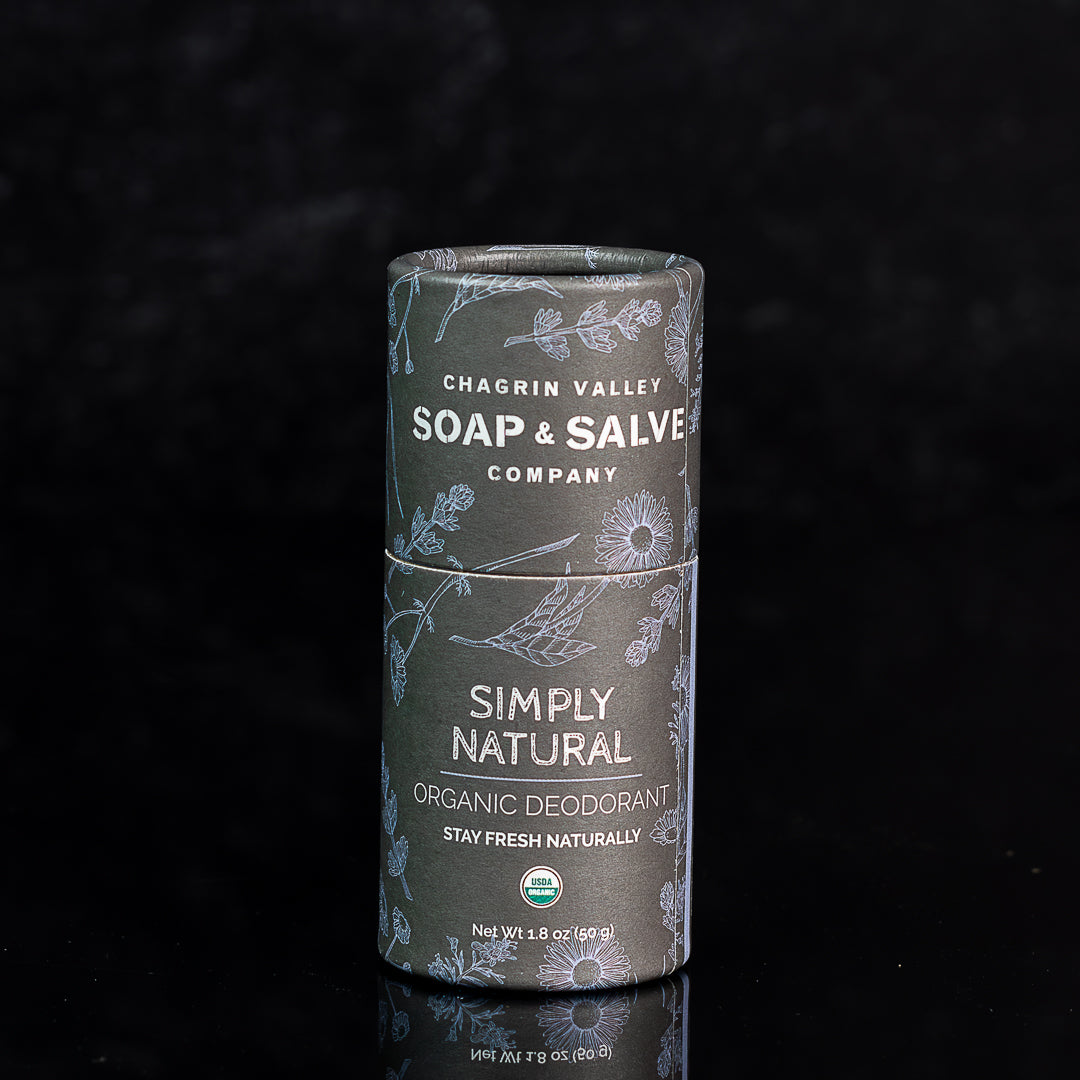
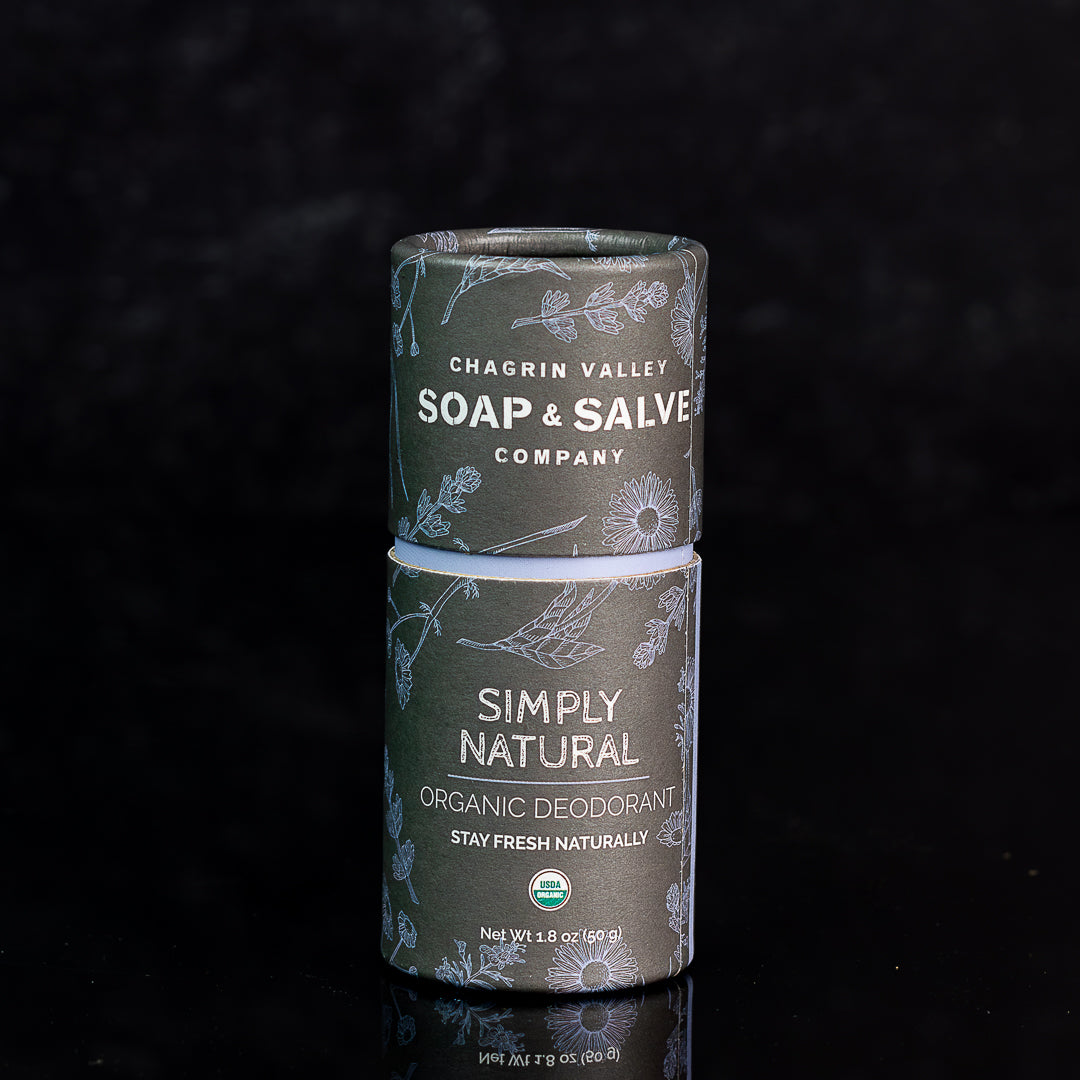
The goal is simple: to Harness the Power & Simplicity of Nature® to cleanse, soothe, heal, and protect your skin and hair!
Our unique formulas rely on moisturizing oils and butters, healing botanicals, and pure essential oils. We choose every ingredient with one end-result in mind….the BEST possible natural skin care for YOU!
 Organic Virgin Coconut Oil*
Organic Virgin Coconut Oil*
 Organic Virgin Shea Butter*
Organic Virgin Shea Butter*
 Baking Soda
Baking Soda
*Ingredient is Fair Trade Certified
Did you ever notice that so many people are ticklish under their arm? Your underarms are one of the most sensitive parts of your body.
You may notice that you can feel a simple touch more than you can on other areas of the body. When you add up all of these factors you can see why underarm skin is not only more sensitive, but also more prone to irritation.
Many people transition seamlessly to a natural deodorant. Others report a transition period.
I do not believe in "armpit detox" the way in which it is described by many companies that sell natural deodorant. Armpit "detox" is simply a normal adjustment period.
We have all heard about detox diets and cleanses for your body. Well now some people are advocating a detox for armpits. The ritual usually involves mixing up armpit masks made with charcoal, clays, or apple cider vinegar and applying them to your armpits to supposedly help “detox” the harmful chemicals that may have built up due ingredients in conventional deodorant or antiperspirants.
The idea behind the armpit detox is that it helps make the transition from an aluminum-based antiperspirant to a natural deodorant easier. However, there is no evidence that an underarm detox will reduce odor or make your new natural deodorant more effective.
 Commercial deodorants and antiperspirants change the types and amounts of bacteria in the armpit which explains why you may sweat more and have a change in body odor initially.
Commercial deodorants and antiperspirants change the types and amounts of bacteria in the armpit which explains why you may sweat more and have a change in body odor initially.
Please do not allow a company to tell you that the increase in odor and/or sweat is the result of your body expelling or flushing out toxins. Your body has a great natural detox system that includes your liver and your kidneys, but your skin--not so much.
What people call and Armpit "detox" is simply a normal adjustment period. You do NOT need to buy armpit "detox" kits.
A simple wash with a gentle soap and water will remove antiperspirant or deodorant on your skin and help control odor.
Our bodies are quite resistant to change. Our bodies enjoy the status quo. They see change as a disruption and often resist change even if it is a positive one.
The bottom line--our body needs time to adjust to change and since each of us is a unique individual and our armpit microbiome is different the timeline varies from person to person.
Ultimately, it depends on your unique body chemistry.
Since there was so much information I wanted to share, I have written two blogs:
Part 1: Transitioning To Natural Deodorant, discusses the why you may experience an adjustment period as well as the possible causes of irritation and or rashes that some may experience when switching from a conventional antiperspirant or deodorant to an all natural deodorant.
Part 2: Transitioning To Natural Deodorant, provides some suggestions to help with the adjustment period and or to help alleviate the causes of irritation. Part 2 also answers some common questions about using a natural deodorant.
 We often receive questions as to whether our soaps, shampoos, and other natural products are safe to use during pregnancy.
We often receive questions as to whether our soaps, shampoos, and other natural products are safe to use during pregnancy.
We recommend that expectant and nursing mothers check with their midwife or physician before changing a skincare routine with our organic products, or any other line of products.
Read the label on a bar of commercial soap. Read the label on your jar of moisturizer.
Now read the ingredients in a Chagrin Valley product.
We use quality natural and USDA Certified Organic ingredients. No synthetic additives, colorants, fragrances, preservatives, or chemical derivatives are used.
There is nothing in our all-natural basic soap or other products that could cause a problem in pregnancy.
Topically applying the herbs present in many of our soaps is also not a problem. Your skin will absorb much less herb from the soap than if you would sprinkle them on your food.
The issue that seems to be of most concern is the use of essential oils during pregnancy.
There is a lot of confusing, ambiguous, and inaccurate information concerning the use of essential oils in pregnancy.
The question of safety and safety testing has a lot to do with several factors.
But also, aromatherapy and massage therapy use much higher concentrations of essential oils than you find in soap or even in eating the herb. With aromatherapy, you are inhaling the high concentrations which get absorbed via the lungs and in massage therapy, the essential oils remain on your skin and are absorbed.
Our scented soaps are gently scented with essential oils, but the choice is between you and your health care professional. The most critical time is the first trimester.
Just about every one of our products, like lip balms, whipped butters, soaps, shampoos, and deodorants has a "no added scent" version.
When there is a growing baby to consider, if you are at all uncertain as to the safety of an essential-oil containing product, or any ingredient, please consult your doctor, midwife, or health care professional!
When it comes to safety during pregnancy it is understandable that many massage therapists and aromatherapists decide to err on the side of caution in recommending the avoidance of certain essential oils.
Some Herbalists and Aromatherapist believe that essential oils that are normally safe to use, are safe during pregnancy, while others will recommend avoiding all essential oils during pregnancy.
Some essential oils that are normally quite safe have hormone-like effects and some even stimulate uterine muscles, both of which would be contraindicated during pregnancy.
Please do not ask us if one of our products is safe to use during pregnancy--we will simply refer you to this page.
We do not provide a list of essential oils considered safe during pregnancy because the information available is very contradictory. One aromatherapy source will list an essential oil as problematic while another one states it is fine.
The information is also changing constantly. Please do your own research and consult your doctor, midwife, or health care professional for the most up-to-date information.
Even if you have never had sensitive skin in the past, you may notice that a product you have been using for several years now irritates your skin.
The stretching belly is often the most sensitive spot. Other potential problem areas include the hips, thighs, and bottom where the skin may become dry and flaky.
Although the exact cause is not known, raging hormones do make you more sensitive to a wide range of things, and also your skin is thinning and stretching as you, and your baby, grow.
These changes can behave in unpredictable ways. For example, if you have eczema you may suffer from major flare-ups or complete remission during pregnancy.
Keep your body well moisturized and avoid products that contain synthetic additives, colorants, fragrances, or preservatives. Any of these can exacerbate sensitive skin problems.
Before trying a new product, you can always do a patch test to test for sensitivity.
And again, we recommend that expectant and nursing mothers check with their midwife or physician before changing a skincare routine with our products, or any other line of products.
Pregnancy & Children: We do not provide information on the safety of essential oils during Pregnancy or for use in Children because the available information is very ambiguous and often contradictory. If you’re interested in using essential oils during pregnancy or with young children please do your own research and consult your doctor, midwife, or health care professional before use.

The most important consideration in any business is its customers. Today's world of misleading claims, false advertising, and simple deception, often leaves consumers trying to discover the truth about personal products and their ingredients.
Some of my favorite products are made with ingredients that just do not exist as certified organic. Why? At this time there are no standards created for ingredients specifically used in the personal care product industry. Organic certification of personal care products is based on the organic food standards set by the National Organic Program of the USDA.
But since we are a certified organic company, we are required to submit documentation that even our "non-organic ingredients" were produced without the use of toxic pesticides, genetically modified organisms (GMOs), sewage sludge, or irradiation.

Why Did We Become a Certified Organic Company?
What Do All of the Organic Labels Mean?
Trying to choose the right natural soaps or skincare products can be a bit overwhelming especially when you have allergies and/or skin sensitivities.
Since we proudly list every ingredient in all of our products, reading the ingredient list will help to eliminate ingredients that may cause you problems.
We always recommend doing a patch test before using any new products especially if you have sensitive skin or allergies.
We receive so many emails asking for help with allergies, we created categories in our “Help Me Choose” section to provide information for those with allergies or sensitivities to nuts, coconut, shea butter and gluten.
Check out our help me choose pages!!
If you are allergic or sensitive to any of the ingredients in our products, they may cause skin irritation. Even natural ingredients may cause sensitivities.
People with severe allergies--please note: If you have severe anaphylactic-type reactions to ANY of the ingredients in ANY of our products, please do not buy our products. We have dedicated soap rooms and product rooms that are kept meticulously clean, but we cannot guarantee against possible cross-contamination of individual ingredients.
 We hand make all of our own products in small batches to ensure freshness, consistency, and perfection.
We hand make all of our own products in small batches to ensure freshness, consistency, and perfection.
Our products are not made to sit on store shelves for years and years.
Although there are natural preservatives within the chemical structure of many natural ingredients, they not as potent as the synthetic preservatives used in commercial products to prolong shelf-life.
Other than soap, our products are remade every few weeks and none are very old when they are sold. Our non-soap products should be opened within 6 months of purchase.
Since we use no preservatives or chemical stabilizers, the more important question is, "how long will the product last once it has been opened?
Once opened, skin care products become exposed to dirt and microorganisms (bacteria, yeasts, and molds) that are found in the air and on the skin.
As soon as you open and begin to use any product, simply the way in which you use it will affect its lifespan.
So, we use the PAO (period-after-opening) symbol. These symbols are already available on the product pages of our website and we are in the process of adding them to all of our labels.
The POA symbol is a standard symbol that identifies the useful lifetime of a skin care product after it has been opened for the first time.
 As you can see from the picture, the symbol is an open jar with a written number and the letter "M" for the word "months."
As you can see from the picture, the symbol is an open jar with a written number and the letter "M" for the word "months."
A product with a "9M" would mean that it is good for 9 months after opening.
Tip: write the date you open a product for the first time on its label so you can keep track of the period after opening.
Our POA number represents our best suggestion. There are many factors that can affect the lifespan of a product. If a product is discolored, has an unpleasant smell or looks odd, the product should not be used and should be discarded.
If you’re like me, and you find an old dusty product hiding in a drawer, makeup bag, or even a suitcase from your last trip, you can call us with the lot number and we can verify its age. Obviously, if it seems off in any way, toss it!
Please note: This PAO symbol is widely used in Europe to recommend the length of time a product remains usable after opening, for products that have a shelf-life of at least 30 months. Our products do NOT have a shelf-life of 30 months before opening.








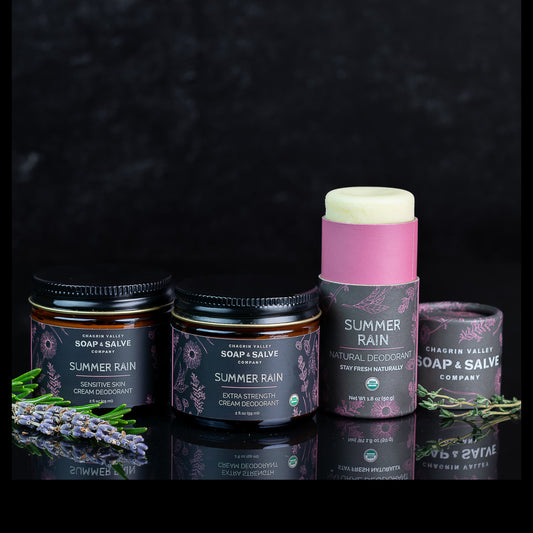
Why use a natural deodorant? The simple answer--why not! While many synthetic skin care ingredients are "considered safe” in small doses, I wonder how much is "a safe small dose" after 65 years.
Read Post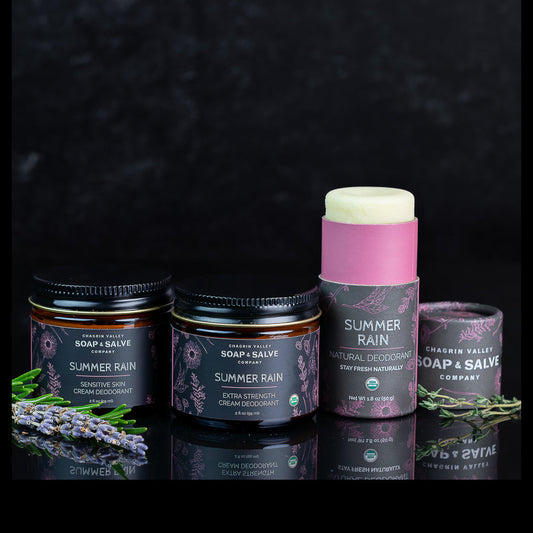
Help Me Choose a Deodorant: No two people are alike as far as their body chemistry goes. Gender, age, race, hormone fluctuations, diet, health, and even medications can affect body chemistry. Body chemistry comes into play with deodorant more than any other hygiene product.
Read Post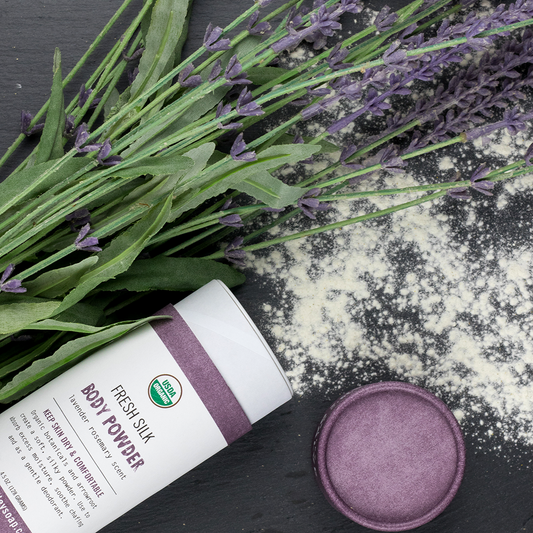
Soft and silky organic root powders, botanicals, and natural clay help absorb perspiration to reduce the friction that causes heat rashes, chafing, and irritation. Great as a powder deodorant that can be applied anywhere on your body.
Read Post